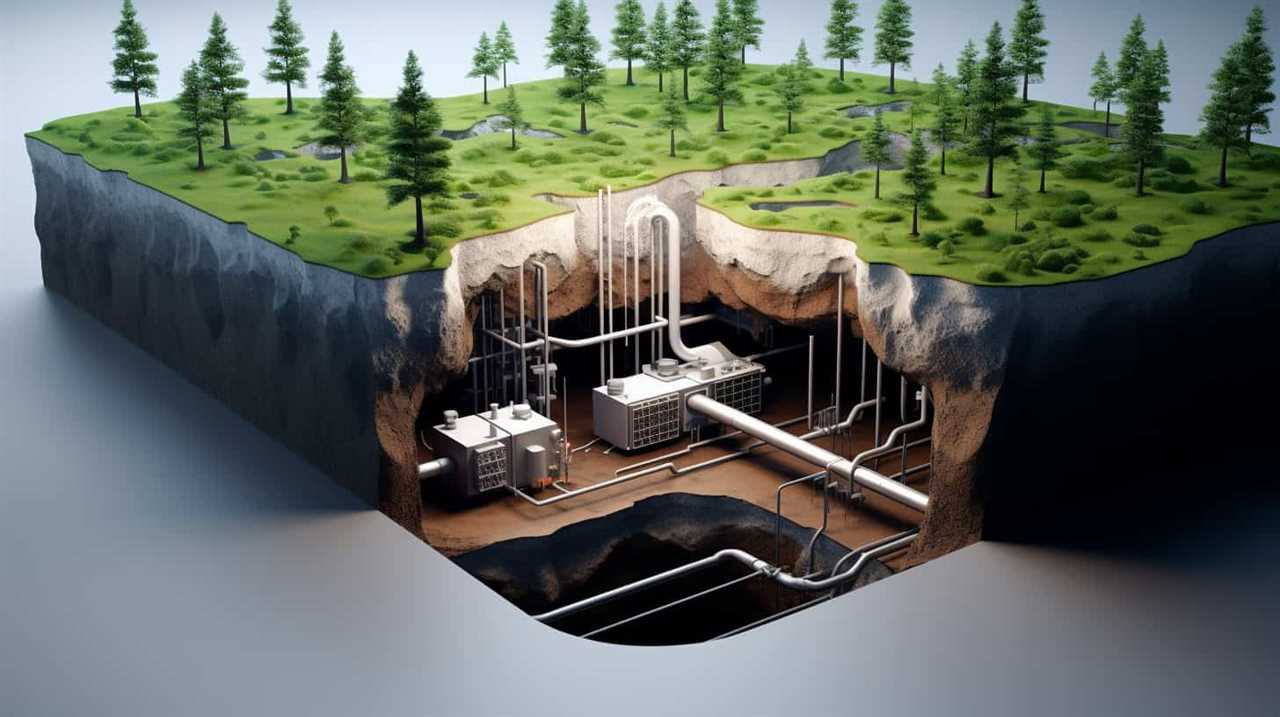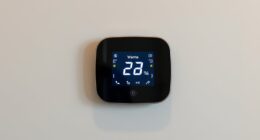Fed up with conventional home heating solutions that are expensive and ineffective? Search no more – consider heat pumps!
These innovative solutions are revolutionizing the way we heat our homes. With their energy-efficient technology and cost-saving benefits, heat pumps are the future of residential heating.
In this article, we will explore the basics, types, installation, maintenance, and future trends of heat pump technology.
Get ready to discover tomorrow’s home heating solutions!

Key Takeaways
- Heat pumps operate by transferring heat using a refrigerant and key components include the compressor, condenser, evaporator, and expansion valve.
- Heat pumps are energy-efficient, reducing electricity bills and minimizing environmental impact. They have lower operating costs compared to traditional heating systems and emit fewer greenhouse gases.
- Heat pumps have a higher coefficient of performance (COP) compared to other heating systems, producing up to three times more heat energy than the electrical energy they consume.
- Heat pumps offer significant energy savings, reduced environmental impact, and long-term cost savings for homeowners. Governments also provide incentives and tax credits for installing energy-efficient technologies like heat pumps.
The Basics of Heat Pumps
We’ll start by explaining the key components of heat pumps.
Heat pump operation involves the transfer of heat from one place to another, using a refrigeration cycle. The main components of a heat pump include the compressor, condenser, evaporator, and expansion valve.
The compressor increases the pressure and temperature of the refrigerant, while the condenser releases heat into the surrounding environment. The evaporator absorbs heat from the source and converts it into a refrigerant vapor.
Lastly, the expansion valve controls the flow of refrigerant to regulate the system.

Heat pump efficiency is a crucial factor in their operation. The coefficient of performance (COP) measures the ratio of heat output to the amount of energy input. Improvements in heat pump technology have led to higher COP values, resulting in greater energy savings and reduced environmental impact.
Understanding Heat Pump Technology
Let’s delve into the intricacies of heat pump technology and gain a better understanding of how it works.
Heat pump operation is based on the principle of transferring heat from one place to another using a refrigerant. The key components of a heat pump include the evaporator, compressor, condenser, and expansion valve.
The process begins with the evaporator, where the refrigerant absorbs heat from the surrounding air or ground. The compressor then increases the pressure and temperature of the refrigerant, pushing it into the condenser.

In the condenser, the refrigerant releases heat, which can be used to warm a space or provide hot water. Finally, the expansion valve lowers the pressure of the refrigerant, allowing it to return to the evaporator to repeat the cycle.
Understanding these heat pump components is essential for comprehending their operation and appreciating their potential in revolutionizing home heating solutions.
Benefits of Heat Pumps for Home Heating
When it comes to home heating, heat pumps offer a range of benefits that make them an attractive option for homeowners. One major advantage is their energy efficiency, as heat pumps can provide more heat energy than the electrical energy they consume.
This not only helps to reduce electricity bills but also minimizes the environmental impact by reducing greenhouse gas emissions.

Additionally, heat pumps have the potential for cost savings over time, as their energy efficiency can lead to lower operating costs compared to traditional heating systems.
Energy Efficiency Advantages
Heat pumps offer significant energy savings for homeowners. By using a small amount of electricity to transfer heat from the air or ground into the home, heat pumps can produce up to three times more heat energy than the electrical energy they consume. This high energy efficiency is a major advantage, resulting in lower energy bills and reduced environmental impact. Compared to traditional heating systems, heat pumps emit fewer greenhouse gases and have a lower carbon footprint. Additionally, heat pumps can also be used for cooling purposes, further enhancing their energy-saving capabilities. The table below illustrates the energy efficiency advantages of heat pumps compared to other heating systems:
| Heating System | Efficiency (COP) |
|---|---|
| Heat Pump | 3.0-4.5 |
| Electric Furnace | 1.0 |
| Gas Furnace | 0.9-0.98 |
| Oil Furnace | 0.8 |
| Biomass Boiler | 0.7-0.9 |
With their superior energy efficiency, heat pumps are a promising solution for homeowners seeking sustainable and cost-effective heating options.
Cost-Saving Potential
We can save a significant amount of money by installing a heat pump for our home heating needs, as well as enjoy the environmental benefits. Heat pumps are an energy efficient technology that can provide long-term savings on our heating costs.

Here are some key reasons why heat pumps are cost-effective:
-
Energy Efficiency: Heat pumps are designed to extract heat from the air or ground, making them highly efficient in converting energy into heat for our homes. This means lower energy consumption and reduced utility bills.
-
Lower Operating Costs: Heat pumps require less maintenance compared to traditional heating systems, resulting in lower operating costs over time.
-
Government Incentives: Many governments provide incentives and tax credits for installing energy efficient technologies like heat pumps, further reducing the upfront costs.

With their energy efficiency and long-term savings potential, heat pumps are a smart choice for homeowners looking to save money and reduce their environmental impact.
In the next section, we’ll explore the specific ways heat pumps can enhance energy efficiency and provide even greater cost savings.
Energy Efficiency and Cost Savings With Heat Pumps
When it comes to energy efficiency and cost savings, heat pumps offer significant benefits.
One of the main advantages is lower energy bills, as heat pumps are known for their ability to efficiently convert energy into heat.

Additionally, heat pumps contribute to environmental sustainability by reducing greenhouse gas emissions compared to traditional heating systems.
Lower Energy Bills
By utilizing heat pumps, we can significantly reduce our energy bills while also improving energy efficiency and achieving cost savings. Heat pumps are a highly efficient heating and cooling system that can lower energy usage and provide increased comfort in our homes.
Here are three key ways in which heat pumps contribute to lower energy bills:
-
Heat pumps utilize renewable energy sources such as air, water, or ground, making them more energy-efficient compared to traditional heating systems.

-
Heat pumps transfer heat from the outside to the inside during colder months, ensuring optimal heating while reducing energy consumption.
-
Heat pumps can also be used for cooling purposes, eliminating the need for separate air conditioning units and reducing overall energy usage.
With their innovative technology and ability to provide both heating and cooling, heat pumps offer a sustainable and cost-effective solution for lower energy bills.
Environmental Sustainability Benefits
Using heat pumps can bring significant environmental sustainability benefits, as they improve energy efficiency and result in cost savings.

Heat pumps utilize renewable energy sources, such as the heat in the air or ground, to generate heat for homes. By harnessing these renewable sources, heat pumps reduce reliance on fossil fuels, which helps to reduce carbon emissions and mitigate climate change.
The improved energy efficiency of heat pumps also leads to reduced energy consumption, resulting in lower electricity bills and cost savings for homeowners.
Additionally, heat pumps operate using a closed-loop system, meaning they don’t release any harmful emissions or pollutants into the environment. This makes heat pumps an environmentally-friendly solution for home heating, offering both economic and ecological advantages.
Types of Heat Pumps for Residential Use
There are three main types of heat pumps that we commonly use for residential heating. These include:

-
Geothermal heat pumps: This type of heat pump utilizes the stable temperature of the earth to provide heating and cooling. It extracts heat from the ground during the winter and transfers it indoors, while in the summer, it removes heat from the indoor air and transfers it back into the ground.
-
Air source heat pumps: These heat pumps extract heat from the outside air and transfer it indoors during the colder months. They can also reverse the process during the summer to provide cooling. Air source heat pumps are efficient and can be a cost-effective option for residential heating.
-
Hybrid heat pumps: Hybrid heat pumps combine the efficiency of air source heat pumps with a secondary heat source, such as a gas or oil furnace. This allows for optimal performance in different weather conditions, ensuring efficient heating and cooling throughout the year.
These types of heat pumps offer innovative solutions for residential heating, providing energy-efficient and environmentally-friendly alternatives to traditional heating systems.

Installation and Maintenance of Heat Pumps
We will discuss the installation and maintenance of heat pumps in the next section. Proper installation is crucial for the optimal performance of a heat pump system. Following installation best practices ensures that the system operates efficiently and effectively. Some key installation considerations include selecting an appropriate location for the outdoor unit, ensuring proper insulation and sealing, and correctly sizing the unit for the space it will be heating or cooling. Regular maintenance is also essential to keep the heat pump running smoothly. Common issues that may arise include refrigerant leaks, airflow problems, and electrical malfunctions. Troubleshooting these issues promptly can prevent further damage and ensure the longevity of the system. By following installation best practices and addressing maintenance issues promptly, homeowners can maximize the benefits of their heat pump system.
| Installation Best Practices | Troubleshooting Common Issues |
|---|---|
| Choose a suitable location for the outdoor unit | Address refrigerant leaks promptly |
| Insulate and seal the system properly | Troubleshoot airflow problems |
| Size the unit correctly for the space it will be heating or cooling | Address electrical malfunctions promptly |
Future Trends in Heat Pump Technology
In the future, we can expect advancements in heat pump technology to revolutionize home heating solutions. The integration of smart heat pump technology with renewable energy sources will pave the way for a more sustainable and efficient heating system.
Here are three key trends to look out for:
-
Enhanced efficiency: Heat pumps will become even more energy efficient, allowing homeowners to reduce their carbon footprint while saving on energy costs.

-
Intelligent controls: Smart heat pump technology will enable precise temperature control and optimization, adapting to changing weather conditions and occupancy patterns.
-
Hybrid systems: Heat pumps will increasingly be integrated with other renewable energy sources such as solar panels or geothermal systems, creating a comprehensive and eco-friendly heating solution.
These advancements in heat pump technology won’t only provide superior comfort and energy savings but also contribute to a greener and more sustainable future.
Frequently Asked Questions
Are Heat Pumps Suitable for All Types of Homes and Climates?
Yes, heat pumps are suitable for all types of homes and climates. Heat pump efficiency is high, providing cost savings compared to traditional heating systems. Their versatility and effectiveness make them a smart choice for innovative homeowners.

How Long Does It Typically Take to Recoup the Initial Investment in a Heat Pump System?
It typically takes a few years to recoup the initial investment in a heat pump system. However, the cost effectiveness of heat pumps is enhanced by their high efficiency, making them a worthwhile long-term investment.
Can a Heat Pump Be Used for Both Heating and Cooling Purposes?
Yes, a heat pump can be used for both heating and cooling purposes. Heat pump efficiency allows for optimal performance, resulting in significant energy savings and the benefits of year-round comfort in residential settings.
Are There Any Government Incentives or Tax Credits Available for Installing a Heat Pump System?
Yes, there are government incentives and tax credits available for installing a heat pump system. These incentives and credits aim to promote the adoption of energy-efficient technologies and reduce carbon emissions in the residential heating sector.
What Are the Potential Drawbacks or Limitations of Using a Heat Pump for Home Heating?
There can be potential maintenance issues with heat pumps, such as regular filter cleaning and occasional refrigerant leaks. However, their energy efficiency outweighs these drawbacks, making them an innovative solution for home heating.

Conclusion
In conclusion, heat pumps are the future of home heating solutions. With their advanced technology and energy efficiency, they offer numerous benefits such as cost savings and environmental friendliness.
The different types of heat pumps available for residential use provide options to suit various needs and preferences. Installation and maintenance are relatively straightforward, making them a practical choice for homeowners.
As heat pump technology continues to evolve, we can expect even more efficient and innovative solutions in the future. Stay tuned for exciting advancements in this field.









